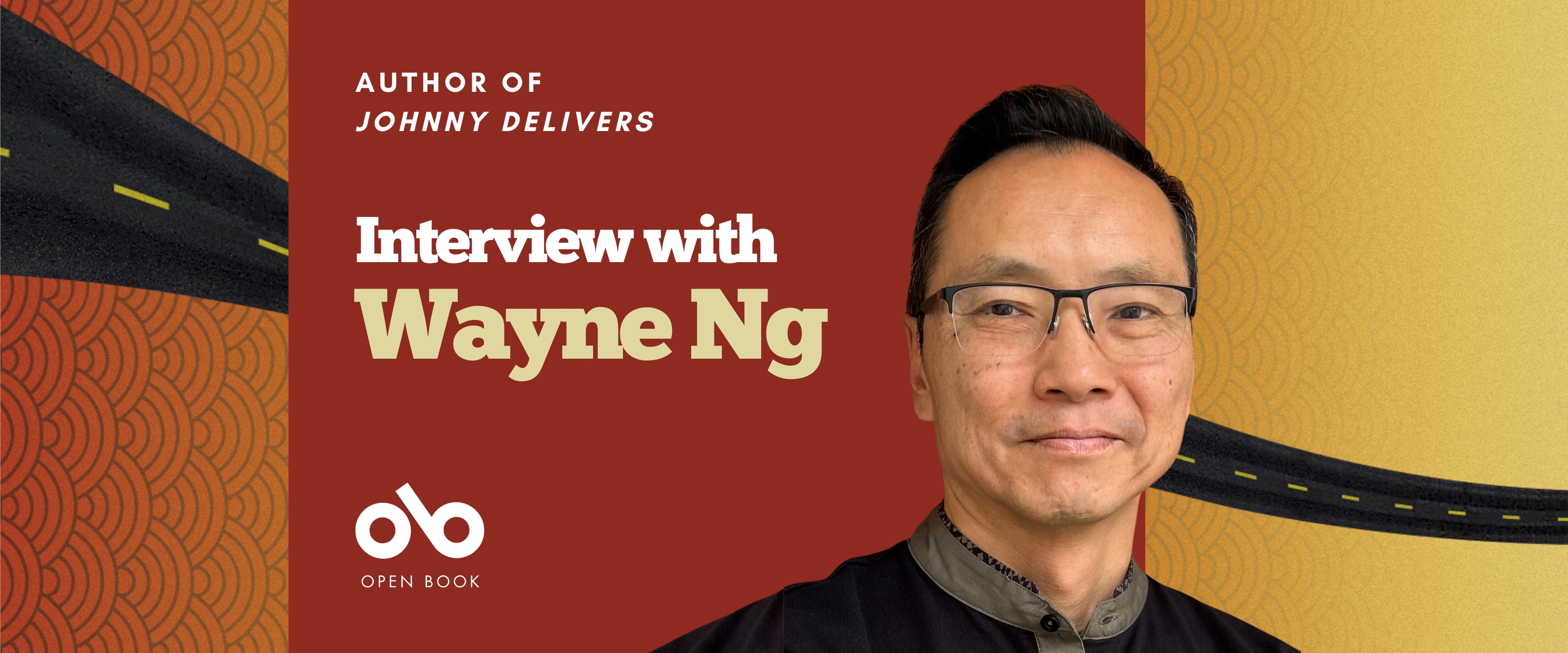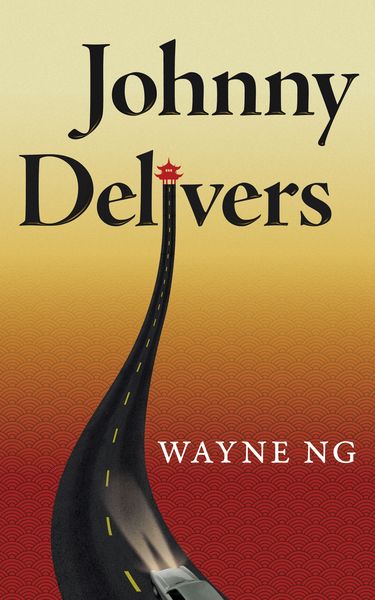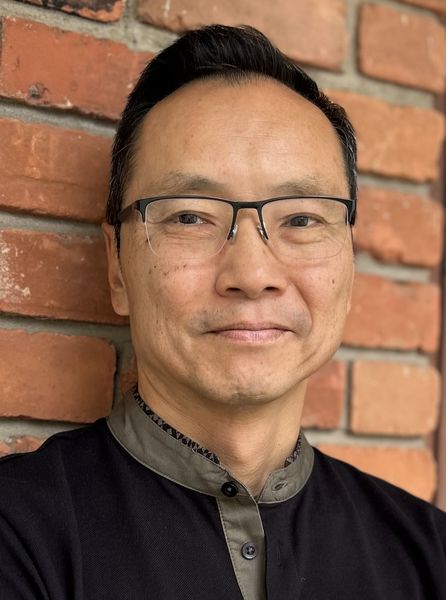A City Teenager Sells Weed with a Side of Egg Rolls to Keep His Family Afloat in Johnny Delivers
Award-winning author and avid world traveler Wayne Ng has found success on the literary scene with his previous works of fiction, using elements from the lived-in experiences of Chinese-Canadian immigrants in a vibrant and rich urban Toronto setting.
In his new novel, Johnny Delivers (Guernica Editions), the author brings us back into the life of Johnny Wong, who was just a young boy trying to navigate a tumultuous city life in the lauded literary-crime novel Letters From Johnny. Now eighteen-years-old, Johnny spends his days delivering Chinese food and trying to keep his family on track. But, when a debt is called in on their restaurant from their eccentric aunt, he faces a hard choice to earn far bigger (legally or not), and ensure that the family business, and the family itself, doesn't break apart at the seams.
We're thrilled to share this Long Story Novelist Interview with the author today on Open Book, where he tells us more about the ingredients that went into this harrowing, nostalgic, and humourous story.
Open Book:
How did you choose the setting of your novel? What connection, if any, did you have to the setting when you began writing?
Wayne Ng:
Johnny Delivers is a standalone follow-up to the critically acclaimed Letters From Johnny, so continuing with the vibrant downtown Toronto setting was an easy decision. This was my childhood playground. I learned to skate at Nathan Phillips Square, my parents did laundry in Kensington Market, they shopped and worked in Chinatown, and I attended Orde Street Public School and Central Technical School. Sam The Record Man on Yonge Street was just a short walk away. All these real places, along with a fictional Chinese restaurant, form the setting, making it deeply personal.
OB:
Did the ending of your novel change at all through your drafts? If so, how?
WN:
The final draft, particularly the ending, went through substantial rewrites. Like Letters From Johnny, the initial structure of Johnny Delivers followed an epistolary format. Early drafts, however, concluded on a much darker note, centred around the shocking and tragic murder of Emanuel Jaques, the immigrant shoeshine boy, in 1977. That event and Bruce Lee’s funeral shaped the original ending, but it felt overwhelmingly bleak. My editor strongly urged me to abandon the child-slaying storyline, and I agreed. While I kept Bruce Lee’s influence in the conclusion, I shifted the tone to one of hope and gratitude, offering a far more uplifting resolution.
OB:
Did you find yourself having a "favourite" amongst your characters? If so, who was it and why?
WN:
A few years after my mother passed, I found myself reflecting on her life and uncovered things I wish I had known while she was still here. She had far more strength and resilience than I ever realized. I channelled that into Johnny’s mother, incorporating some familiar traits of Asian moms—demanding, stern, emotionally distant, and secretive. But I also gave her depth and heroism, qualities I now regret not recognizing in my own mother.
Your CanLit News
Subscribe to Open Book’s newsletter to get local book events, literary content, writing tips, and more in your inbox
OB:
If you had to describe your book in one sentence, what would you say?
WN:
Eighteen-year-old Johnny Wong puts his future on the line by selling weed with egg rolls, then faces off in a high-stakes mah jong game against his villainous aunt to save his family and their restaurant from ruinous debt.
OB:
Did you do any specific research for this novel? Tell us a bit about that process.
WN:
A lot! I delved deep into Bruce Lee’s life and work (even visiting his gravesite in Seattle). I immersed myself in Chinese Canadian history, particularly the Wong Association in Vancouver, the discriminatory Head Tax and Exclusion Act, and the stories of paper families and the Triads. I learned how to play mah jong, revisited '70s nostalgia (music, culture, fashion—so cringe-worthy now!), and pored over pictures of Yonge Street in the 1970s, which was a notorious sex and sin strip then. I even interviewed one of the DJs from the Zanzibar strip club. I also researched the tragic slaying of Emanuel Jaques, a story that still haunts those who lived through it. What made writing this novel especially challenging was that it felt like an unintentional memoir, where I unearthed parts of my own family history and revisited my teen years, which were far from joyful.
OB:
What was the strangest or most memorable moment or experience during the writing process for you?
WN:
I thought I was ready to hand the final draft over to my editor. Then, I visited the new Chinese Canadian Museum in Vancouver. Like all great museums, it used personal stories to convey the history. They highlighted the lives of just a few of the thousands of lonely, isolated Chinese bachelors in Canada—my grandfather among them. I had always known this on an intellectual level, but seeing and feeling their stories on the museum walls made me realize I was missing an essential emotional connection. I wasn’t fully linking my grandfather’s experience with Johnny’s journey. That visit led me to rewrite large sections of the manuscript, introducing a new character to represent my grandfather and the Associations he likely frequented.
OB:
Did you celebrate finishing your final draft or any other milestones during the writing process? If so, how?
WN:
My partner Trish and I love celebrating a job well done by going out for a nice meal. It's our tradition after signing off on a completed manuscript—always a fantastic feeling.
OB:
Who did you dedicate your novel to, and why?
WN:
Johnny Delivers is dedicated to all the paper families and their untold stories. There are likely thousands of descendants of these families in Canada. While the country welcomed waves of immigrants from Europe and the U.S., it specifically excluded the Chinese through discriminatory laws. As a result, the only way for many Chinese immigrants to come to Canada was by using assumed identities, often purchasing false documents. The identities were sometimes real, but birth certificates and official records weren’t available. Many immigrants lived in quiet fear, raising families under the constant threat of being discovered and deported. Even after an amnesty in 1960, many of their stories remained unspoken.
Many paper children, including my mother and uncle, kept these secrets, leaving their descendants with little connection to their family’s history.
___________________________________
Wayne Ng was born in downtown Toronto to Chinese immigrants who fed him a steady diet of bitter melons and kung fu movies. Ng works as a school social worker in Ottawa but lives to write, travel, eat and play, preferably all at the same time. He is an award-winning author and traveler who continues to push his boundaries from the Arctic to the Antarctic. Author of The Family Code, Letters From Johnny, and Finding The Way: A Novel of Lao Tzu. Connect with him at waynengwrites.com







